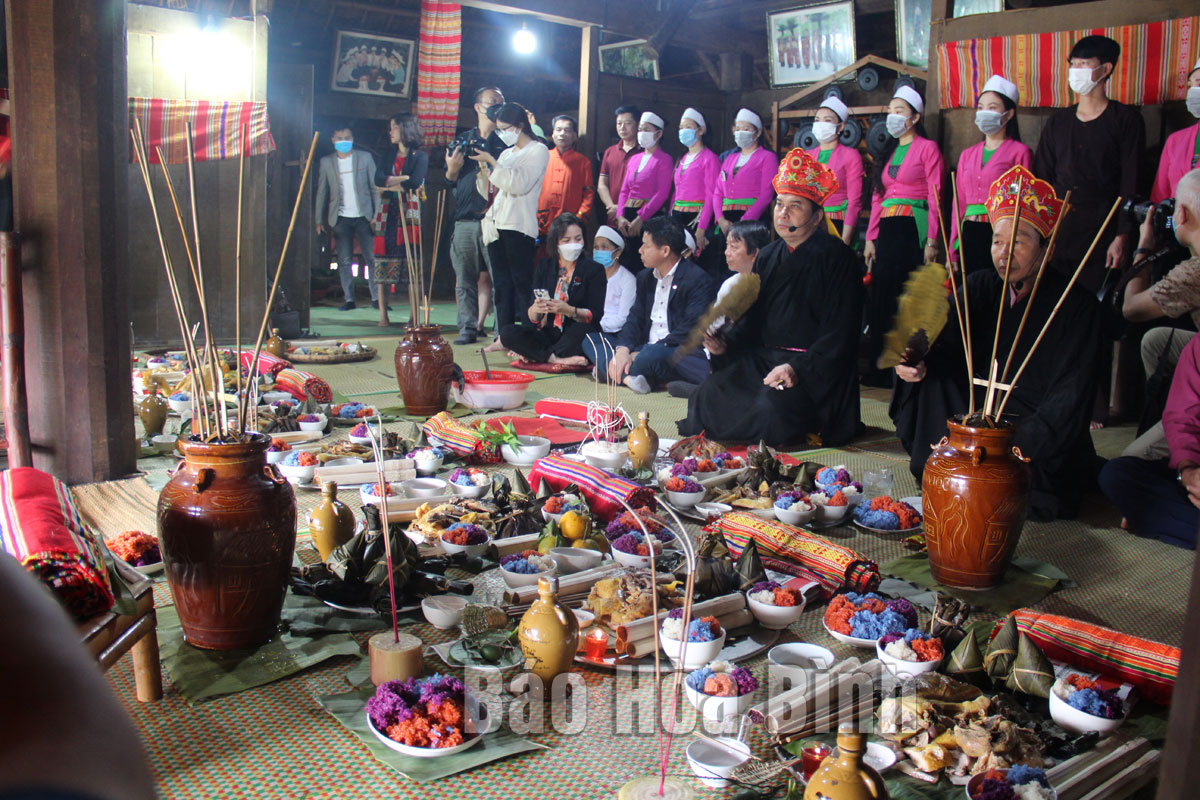
(HBO) – The house-cooling ritual of Muong ethnic people in Hoa Binh province was re-enacted at the Vietnamese Ethnic Culture Village in Dong Mo Commune, Son Tay Town, Hanoi on November 21 in response to the 2021 "Great unity of nations - Vietnamese Cultural Heritage" Week.
The
shaman invites the tutelary God of the village to attend the house cooling
ceremony.
The house-cooling ritual is one of the traditional rituals of the Muong people
which aims to pray for favourable weather conditions, bumper crops and good
health for everyone. After preparing the offerings, the shaman invites Thanh
Hoang (Tutelary God ) and other saints to attend the house-cooling ceremony to
bless.
The house cooling ceremony is one of the traditional rituals of the Muong
people, in order to pray for favourable rain, good wind, good crops, and good
health for everyone. In the space of the Muong house, after preparing the
offerings of offerings, the magician reads vows to invite the Holy Scriptures,
Thanh Hoang and his superiors to attend the house-warming ceremony to pray for
health, luck and a good crop.
The shaman made a ceremony to sprinkle water to cool the offerings and tell the
story of the Muong people. He offered offerings and wine to the ancestors and
said goodbye to the holy saints. Then, the shaman would sprinkle water, chant
mantras to cool the furniture in the house.
At the end of the ritual, the shaman would ask for
names, then cast a spell and tied a red thread around the wrists of
participants. This was a form of praying for luck, health, and harmonious life.
After the ritual part ends, the Muong people invite the shaman, ethnic minority
groups living in the village and tourists to drink wine together. By doing so,
they finished a meaningful and equally solemn rendition of the Muong ethnic
identity.
The "Great Unity of Ethnic Groups - Vietnam's Cultural Heritage" week
in 2021 will take place from November 18 to 23, with many interesting and
meaningful programs and events, contributing to promoting the cultural identity
of the community of 54 ethnic groups in implementing the movement "All
people unite to build a cultural life", protect and promote the values of
community cultural heritage and build an advanced Vietnamese culture imbued
ethnic identities./.
The clothing of women reflects the culture of the Muong, Thai, Tay, Dao, and Mong ethnic groups in the northern province of Hoa Binh.
Gongs hold a special place in the cultural and spiritual life of the Muong ethnic people in Hoa Binh province. More than musical instruments, they are an indispensable part of community rituals and collective memory, echoing through generations as a spiritual thread linking the past, present, and future.
Preserving and promoting the cultural values of the Muong ethnic group has become an urgent task in the current context, as many traditional values face the risk of fading away. This effort requires not only protecting the cultural identity but also eliminating outdated customs and developing a modern cultural lifestyle, contributing to sustainable values for the Muong community in Hoa Binh province.
The Muong ethnic culture, deeply rooted in Vietnam’s mountainous north, continues to be preserved and revitalised by dedicated individuals and communities determined to safeguard their ancestral identity.
The Muong group is one of the largest ethnic minorities in Vietnam, primarily found in Hoa Binh province. The Muong people in Hoa Binh boast a rich and diverse cultural treasure that reflects the unique identity of this ethnic group. Accounting for over 63% of the province's population, they have created and preserved numerous distinctive cultural values, contributing to their unique identity. Their cultural heritage is an invaluable asset, at the heart of their national identity, and represents a vibrant spiritual life that must be preserved and promoted in today’s modern world.
For generations, the ethnic communities of Hoa Binh province, particularly the Muong people, have preserved vibrant festivals deeply intertwined with the region’s geography, nature, and social traditions. These celebrations enrich Hoa Binh’s spiritual life and cultural identity, reflecting both folk beliefs and the intermingling of ethnic customs. Many of these festivals have endured the test of time, passed down through generations and continuing to thrive today. Among them, the Khai Ha (Going Down to the Field) festival stands out as one of the most significant events of the Muong ethnic group.



